2010 to 2019 - a decade of change on island of Ireland
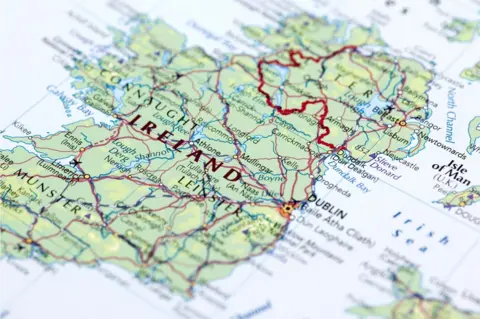 Getty Images
Getty ImagesMany would argue that you have to look at events over the course of centuries, not decades, to explain the relationship between the two islands separated by the Irish Sea.
But the last 10 years have seen momentous shifts in Northern Ireland and the Irish Republic that have profound implications for how the 2020s may unfold.
At the beginning of the decade which is now ending, relations between the UK and its nearest neighbour had never been better.
The state visit of Queen Elizabeth II to Dublin in 2011 was hugely successful - seen as putting a seal on a peace process that had delivered relative stability to Northern Ireland after a conflict that killed more than 3,500 people.
A few years previously, British and Irish governments had succeeded in brokering a settlement between unionists and Irish nationalists who shared power in the devolved government in Belfast.
But the détente has been disrupted.
Brexit has redefined the dynamics, bringing to the fore questions of sovereignty, identity and borders.
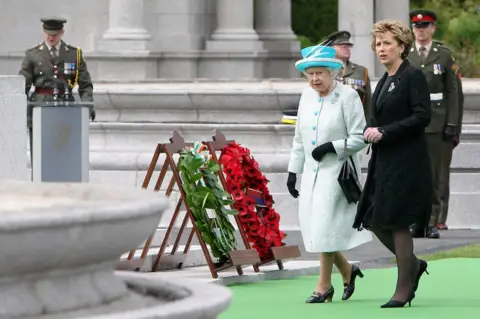 Getty Images
Getty ImagesThe UK's only land frontier with another EU state - on the island of Ireland - may be almost invisible to those crossing, it but it became massively prominent during the Brexit process.
The vexed issue of how to keep the border essentially open generated tensions between London and Dublin and deepened divisions between Northern Ireland's politicians.
The devolved administration collapsed almost three years ago due to non-Brexit matters.
'Rise of the centre ground'
All that means Northern Ireland's constitutional future is being discussed noticeably more - in newspaper columns, online forums and conversations over the airwaves.
For analysts of political trends, it's rather convenient that the decade has been bookended by general elections.
In the 2010 poll in Northern Ireland, unionists pulled in approximately 50% of the vote share.
Nationalist parties polled roughly 42%, with politicians who characterise themselves as neutral on the constitutional question receiving the remaining 8%.
The results from this month show a significant shift.
The approximate figures were unionists 43%, nationalists 39% and the "non-aligned" 18%.
The rise of parties that characterise themselves as neither unionist nor nationalist - the biggest of which is the Alliance Party - has become clear in the last year of the decade.
The Alliance Party, the Green Party and People Before Profit made striking gains in the council elections in May 2019.
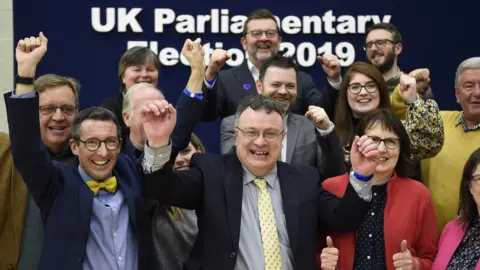 PA Media
PA MediaA few weeks later, the Alliance Party leader Naomi Long took a seat in the European Parliament from the Ulster Unionist Party.
The "Alliance surge" was confirmed in the general election on 12 December, when the party won a Westminster seat for only the second time.
No figures from any election can deliver the full picture on what voters feel about Northern Ireland's place in the UK.
But a basic glance at the numbers from 2010 and 2019 suggest that while both of the big two community blocs have seen a fall in their vote share unionism has taken a bigger hit.
In the foothills of the 2020s, we can expect plenty of debate about what the growth of the "centre ground" means for Northern Ireland - its governance, society and constitutional future.
'Tricky political navigation ahead'
There will be several events that will strongly contribute to that discussion.
In 2021, it will be a century since Northern Ireland was founded and the rest of the Ireland broke away from the UK.
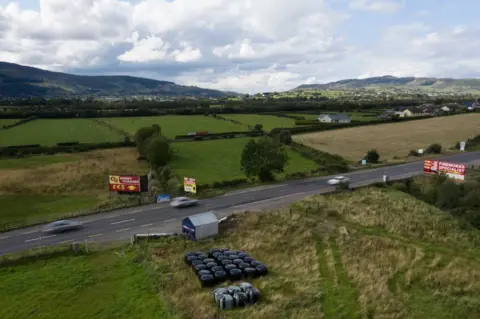 Getty Images
Getty ImagesOn 3 May 1921, Northern Ireland was created as a legal entity by legislation passed by MPs in London that was intended to set up parliaments in Belfast and Dublin.
The six counties that were governed from Belfast remained in the UK but the other 26 became the Irish Free State and eventually the Republic of Ireland.
The centenary will require some tricky political navigation.
For unionists, it will mark a hundred years of the United Kingdom in its present form and the beginning of the state that preserved their place in it.
But nationalists are more inclined to view it as the anniversary of the partition of Ireland, which left people who identified as Irish as a significant minority in a territory that was designed to be politically dominated by unionists.
It isn't clear yet how the centenary will be officially marked but it is certain that a general sense of historical reflection will generate much conversation about Northern Ireland's past, present and future.
2021 will also see the gathering of the 10-yearly census in the UK.
Politicians, commentators and policymakers are wary of directly linking people's religious background to their stance on national identity - in other words assuming that Protestants will automatically identify as British, and Catholics as Irish.
Nonetheless, people's declared allegiance to Protestantism or Catholicism are used as ethnic markers in Northern Ireland - for example, in matters of equal opportunity such as fair employment.
In 2011, 48% of the population identified as Protestant - a drop of 5% on the 2011 figure.
Some 45% said they were Catholic - an increase of 1% - with 7% saying they belonged to another religion or none.
One of the reasons for the trend is that the Protestant population is an older community.
Initial census results will be published in 2022 and the demographic trajectory will be carefully analysed.
'Brexit effects critical for NI direction'
The first election of the next decade in Northern Ireland is also scheduled for 2022.
Voters will decide the make-up of the devolved assembly at Stormont.
In the last such poll - held after the power-sharing administration collapsed in 2017 - unionists lost their overall majority in the chamber for the first time.
There is a chance there could be an assembly election as early as March 2020 if the current negotiations to restore power-sharing fail.
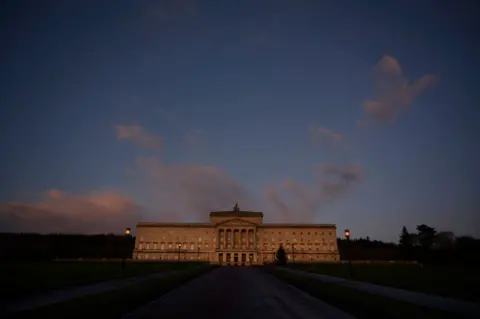 Getty Images
Getty ImagesBut if the next poll is held in 2022 it may provide the first signs of what people in Northern Ireland think about the impact of Brexit.
The effects of the UK's departure from the EU - economic, political and social - will be a critical factor in determining the direction of Northern Ireland in the 2020s.
One of the key questions is whether the economy will be reoriented more towards Dublin and Brussels and away from Britain as a result of what unionists call a "border in the Irish Sea" and what the consequences would be for Northern Ireland's prosperity.
Under the terms of Brexit, Northern Ireland will continue to follow a number of European regulations for goods and administer EU customs procedures, while also remaining in the UK's customs territory.
That means there will be some checks on goods moving between Great Britain and Northern Ireland after the Brexit transition period, which is set to last until the end of 2020.
The 2010s began with the Republic of Ireland in economic meltdown following the global financial crash.
But it has made a strong recovery and its economy is now consistently ranked as among the fastest-growing in Europe.
Northern Ireland's growth rate is comparable to the most poorly-performing UK regions.
One of the reasons why unionists oppose the Brexit deal is that they argue it will create trade barriers between Northern Ireland and its most important external market - the rest of the UK.
The biggest unionist party, the Democratic Unionist Party (DUP) campaigned for the UK to leave the EU and is still fundamentally eurosceptic in spite of its concerns about the terms of Britain's withdrawal.
Nationalists and the Alliance Party oppose Brexit altogether.
Supporters of Irish unity point to the fact that 56% of people in Northern Ireland wanted to remain in the EU in contrast to the verdict across the UK.
'Violence recedes further into history'
Sinn Fein says it wants a "border poll" - a referendum on Irish unity - within the next five years.
The Good Friday peace agreement, which in effect ended the conflict in 1998, says the British government "shall exercise the power" to call such a referendum "if at any time it appears likely… that a majority of those voting would express a wish that Northern Ireland should cease to be part of the United Kingdom".
Ministers in London and Dublin have clearly stated they do not believe those conditions have been met.
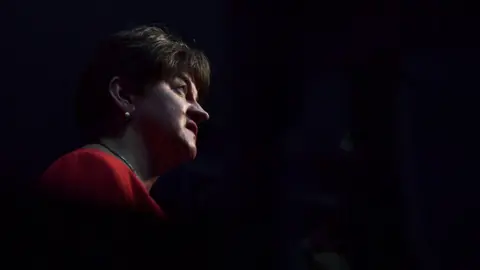 Getty Images
Getty ImagesIt appears that unionists are re-assessing their strategy amidst changing times.
The DUP leader Arlene Foster has recently spoken of the need to build "next generation unionism" - a "collaborative vision" to widen support for Northern Ireland's status in the UK.
The debate in Northern Ireland is also bound to be affected by any movement on the question of Scottish independence.
At the turn of the decade it is important to consider how different the first 20 years of the 21st Century have been from the latter part of the 20th.
There can be few places in the developed world that have seen such a transformation and the days of widespread violence have receded further into history.
However, paramilitary groups on both sides of the societal divide remain active and many retain strong memories of the times when murder was commonplace.
Everyone involved in the Brexit process has said protecting the peace has been paramount.
In an era of uncertainty one undoubtable truth is that visionary political leadership will be vitally important in the 2020s.
